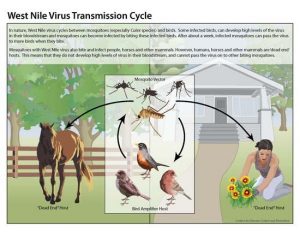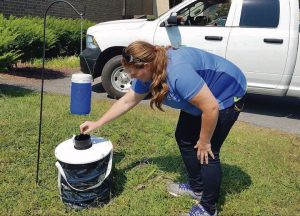It’s summer and bug bites are part of the season for some of us. The northcentral region of Pennsylvania has had several “hits” for West Nile virus. Thankfully, no human cases have been diagnosed.
 The West Nile virus can infect humans, birds, mosquitoes, horses, and some other mammals. Humans get West Nile from the bite of an infected mosquito. The virus occurs in late summer and early fall in mild zones like Pennsylvania.
The West Nile virus can infect humans, birds, mosquitoes, horses, and some other mammals. Humans get West Nile from the bite of an infected mosquito. The virus occurs in late summer and early fall in mild zones like Pennsylvania.
West Nile virus is spread to humans through the bite of an infected female mosquito. The mosquitoes get the virus when they bite an infected bird. Crows and jays are the most common birds linked to the virus. But at least 110 other bird species also have the virus.
Most people infected with West Nile virus have only mild, flu-like symptoms lasting a few days. The symptoms usually appear within 3 to 14 days of infection.
- Fever
- Headache
- Body aches
- Skin rash on trunk of body
- Swollen lymph glands
More severe cases can occur when the virus crosses the blood-brain barrier. If you experience any of the following symptoms, you should seek medical attention right away:
- High fever
- Neck stiffness
- Stupor (a state of impaired consciousness, extreme lethargy, and reduced reactivity to outside stimuli)
- Disorientation
- Coma
- Tremors
- Convulsions
- Muscle weakness
- Paralysis
Pennsylvania has developed a comprehensive network covering 40 counties to trap mosquitoes, collect dead birds, and monitor horses and people. The network is housed at DEP and has information and resources available.

The photo shows a West Nile Virus technician setting a mosquito trap. The trap captures mosquitoes so they can be tested for the virus. If the virus is found in the tests, DEP can take any appropriate action.
It’s important that we do what we can to reduce “mosquito breeding areas” near our homes and works. Here are a few things you can do…
- Apply insect repellent containing DEET (N,N-diethyl-meta-toluamide) when you’re outdoors.
- When possible, wear long-sleeved shirts and long pants treated with repellents containing permethrin or DEET since mosquitoes may bite through thin clothing.
- Consider staying indoors at dawn, dusk, and in the early evening. These are peak hours for mosquito bites, especially those mosquitoes that carry the West Nile virus.
- Limit the number of places for mosquitoes to lay their eggs by getting rid of standing water sources from around your home.
- Use screens on windows and doors. Repair holes in screens to keep mosquitoes outside.
- Once a week, empty and scrub, turn over, cover, or throw out items that hold water, such as buckets, planters, toys, pools, birdbaths, flowerpots, or trash containers. Check inside and outside your home. Mosquitoes lay eggs near water.

